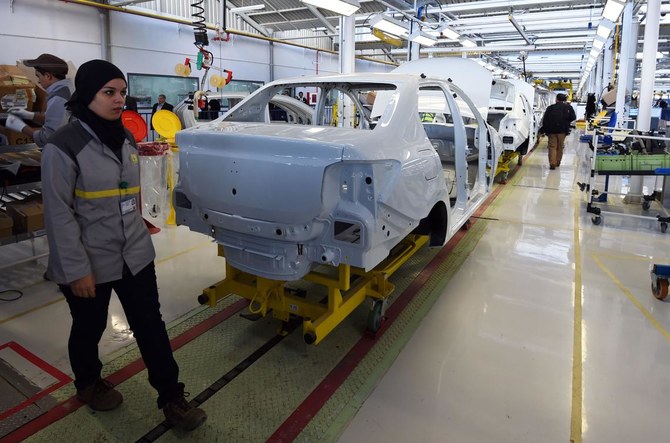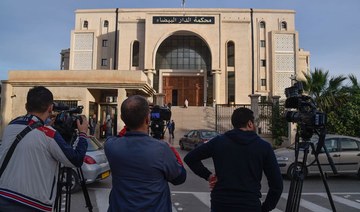ALGIERS: Shuttered assembly plants, jailed bosses, laid-off workers. Algeria’s once ambitious plans to create a flagship auto industry have turned into a fiasco.
The country’s recent years of political turmoil have also seen its foreign joint venture factories close and cronies of its ousted president Abdelaziz Bouteflika end up behind bars.
Algeria’s dream of creating thousands of jobs has collapsed and the country is in dire need of new vehicles.
The government is putting on a brave face.
Industry Minister Ferhat-Ait Ali pledged last month that it is “preparing the revival of this industry on solid foundations, which break with the practices of the past.”
Algeria’s auto industry was born in 2012 when French maker Renault partnered with the government in Algiers to build the first plant two years later near Oran, the country’s second biggest city.
Other companies followed suit.
South Korea’s Hyundai opened its assembly plant in 2016 in Tiaret, and Germany’s Volkswagen started operations the next year in Relizane.
The sector became a priority as the North African country sought to reduce imports, compete in the sector with regional rival Morocco, and diversify its economy in the face of falling oil revenues, which had been the source of over 90 percent of its export earnings.
Morocco’s own bet on the automobile industry has paid off.
It is now the country’s top export sector after the Renault-Nissan group opened two factories in the kingdom in 2012 and 2019, followed by its rival PSA, which opened one in 2019, attracted by incentivising fiscal and customs policies.
But Algeria’s industry became embroiled in controversy from early 2017, when authorities started to denounce as “disguised imports” the practice of foreign carmakers bringing in “semi knocked-down” (SKD) units.
SKD units are partially stripped down at the origin and reassembled on arrival, requiring minimal labor input.
The government investigated Hyundai after images spread on social media showed almost completely-built imported models that required little more work than putting on the wheels.
In July 2017, former industry minister Mahdjoub Bedda, who is now in prison on graft charges related to the wider scandal, suspended all new car assembly projects.
After Bouteflika, under pressure from mass demonstrations, was ousted by the army in April 2019, several assembly plant bosses were convicted of corruption.
His successor, President Abdelmadjid Tebboune, pledged to review the entire auto sector as soon as he came to power in December that year.
“Some projects cannot be described as an industry because they are simply disguised imports,” he charged the day after his election.
Algeria then banned the import of spare parts for assembly plants, sounding the death knell for the young industry already struggling after the incarceration of its key executives.
Volkswagen suspended production indefinitely in December 2019 and put 700 employees on technical unemployment.
In May 2020, the Algerian subsidiary of South Korea’s Kia closed its assembly line, throwing 1,200 employees out of work.
The automobile scandal was at the heart of the first major corruption trials of the post-Bouteflika era.
They exposed that companies owned by tycoons linked to Bouteflika’s inner circle were favored and benefited from undue privileges, such as state incentives and tax exemptions.
The scandal led to the imprisonment of former prime ministers Ahmed Ouyahia and Abdelmalek Sellal and two industry ministers.
The ex-premiers were convicted of “misappropriation of public funds, abuse of power and granting undue privileges” as well as illegal financing of ailing Bouteflika’s aborted 2019 re-election bid.
Corporate heavyweights, such as Mahieddine Tahkout, owner of the Hyundai plant, and VW factory owner Mourad Oulmi, also received heavy prison sentences in separate cases.
Seeking to prevent a repetition of the debacle, the government adopted new rules last August, notably requiring that vehicles sold in Algeria contain 30 percent locally manufactured parts.
Industry experts have, however, warned that such rules are unrealistic.
“It is illusory to claim to be setting up an automobile industry without (local) know-how,” said journalist Mourad Saadi, who has reported on the auto industry since 1999.
Saadi said the automobile assembly sector had failed mainly because Algeria lacks suppliers who can manufacture locally made parts.
Ali, the industry minister, already under fire for delays in drawing up the new rules, recently spoke of talks “with German and other global operators to launch a real industry for tourist and utility vehicles.”
But, for the moment, no manufacturers have taken the plunge back into Algeria.
Mohamed Yadadden, a former executive turned consultant, said setting up “a real production plant requires on average of five to 10 years to respond to the industrial challenges.”
He also said it would need to build at least 150,000 units a year to guarantee profitability — no mean feat in Algeria, a country of 43 million people, where total demand is estimated at 450,000 units a year.





















